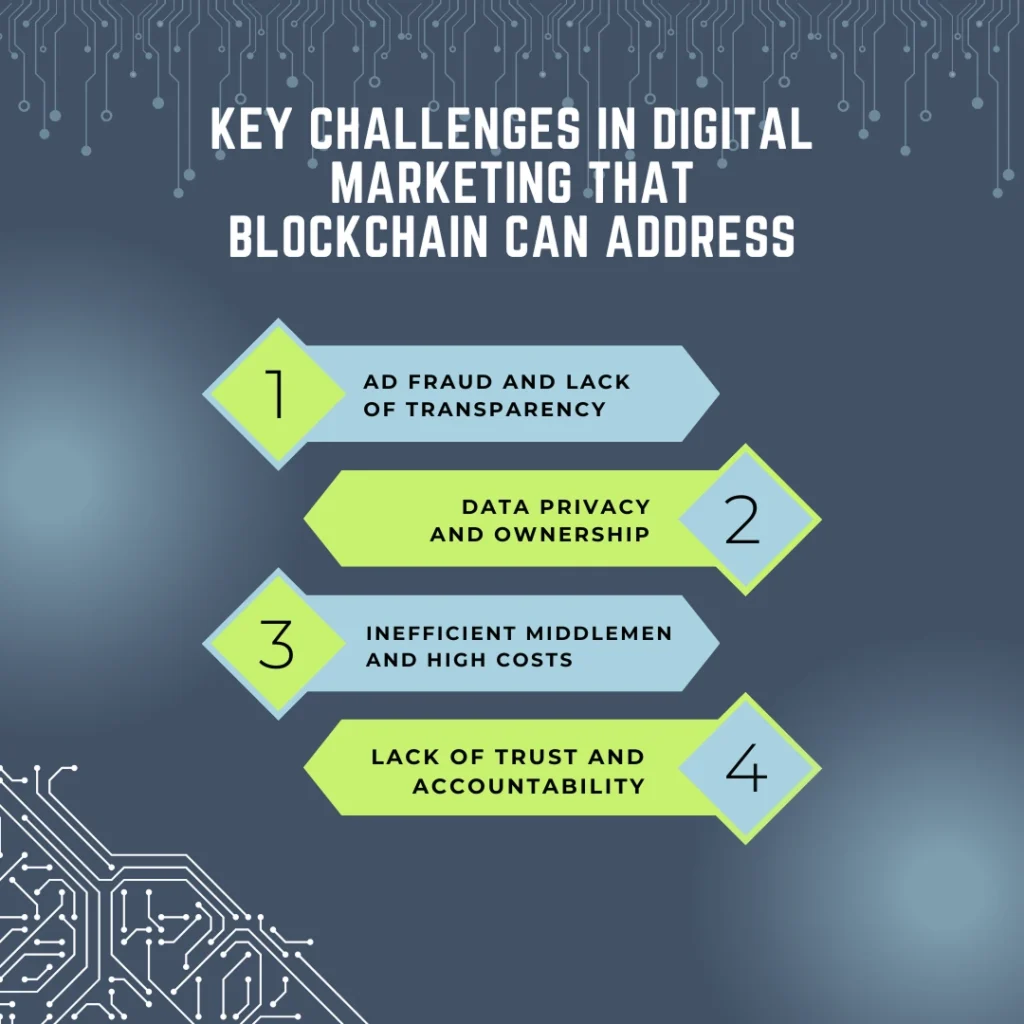Digital marketers spend billions annually, yet an ongoing issue exists: Ad fraud. According to estimates, fraud alone reportedly takes in an estimated annual haul of $100 billion dollars – leaving an immense sum wasted each year.
Marketers face additional hurdles. New regulations such as GDPR and CCPA make data handling increasingly complex; lack of transparency regarding ad spend makes advertising ineffective, while targeting issues and low ROI are compounded in their efforts.
Digital advertising presents many challenges despite its fancy tools; significant inefficiencies and trust issues remain problems in this space. But what if there was another solution? One that brought back transparency while giving consumers actual ownership over their data while significantly decreasing fraud? Blockchain in digital marketing provides this powerful new solution by offering real solutions to long-standing issues with marketing practices.
What is Blockchain?
Blockchain is an innovative form of database known as Distributed Ledger Technology (DLT), similar to an electronic record book, which is constantly shared and updated without being stored all in one central place. Instead, its data resides across numerous computers worldwide.
Each new entry in this book constitutes a “block,” connected securely by links with those before. This unique structure offers several key benefits for blockchain in digital marketing:
Decentralization: No single person or company owns and runs the blockchain network; all members contribute towards maintaining it for maximum strength, making this method of protecting data even harder to manipulate or breach.
Transparency (within the network): Every transaction on the blockchain is visible to everyone within it, and this increases openness while building trust between users.
Immutability (Tamper-Proof): Once information has been added to a blockchain, it remains immutable; you cannot alter or remove it after having been added there. Any attempt at changing records would break the chain immediately – making data extremely reliable in this “write-once” environment.
Security (Cryptography): Blockchain utilizes strong codes to safeguard each block and verify transactions, limiting unauthorized entry and keeping your data safe from prying eyes.
How Blockchain is Revolutionizing Digital Marketing: Key Use Cases
Blockchain in digital marketing isn’t simply an abstract concept – it offers real-world solutions and is actively changing how marketers operate. Here are a few blockchain use cases in marketing which showcase its revolutionary impact:
Enhancing Ad Transparency and Combatting Fraud
Ad fraud costs businesses billions every year and has become an enormous problem. Blockchain provides a strong solution. By creating an unalterable record that tracks every ad impression and click, blockchain helps reduce bot traffic by only counting legitimate engagements as data points.
Think smart contracts; these self-executing agreements allow publishers to be paid automatically when ads meet specific, verified conditions – eliminating intermediaries while guaranteeing accurate payments. One such innovative contract platform is Brave Browser, which uses Basic Attention Token (BAT). Users earn this cryptocurrency for viewing privacy-protecting ads while advertisers know their ads will reach real people, which builds immense trust and transparency between the parties involved.
Empowering Data Privacy and Ownership for Users-Centric Data Sets
Data privacy has become an increasing priority. Consumers worry about who uses their information, while Blockchain gives people back control by giving individuals ownership over their data – they decide who has access and can modify access permission accordingly.
Users may also be rewarded for sharing their data – often with cryptocurrency tokens – creating an equitable exchange in which consumers gain value from sharing information. At the same time, brands gain trusted, consented data that builds a lasting bond with consumers. Decentralized identity solutions offer users a safe way to control and safeguard their digital identities to guarantee privacy always remains protected.
Improving Attribution and Campaign Measurement
Understanding what drives sales is key, known as attribution. Unfortunately, current methodologies can be complex and fraught with disputes; blockchain provides immutable records of customer journeys: every touchpoint from click-through and click-back through purchase is recorded, creating a transparent path leading directly back to purchase decisions.
Marketers can utilize this to build accurate attribution models. By seeing which marketing efforts truly contribute to conversions, marketers can eliminate arguments over credit. Furthermore, real-time insights into campaign performance provide real-time analysis so brands can quickly optimize strategies, leading to improved results and higher returns.
Building Trust and Reputation for Brand Reputation
Trust is key to brand reputation; consumers want assurances their purchases are genuine, and the business follows ethical practices. Blockchain in digital marketing provides another solution; this platform verifies product authenticity through supply chain tracking as well as QR code scanning, so consumers can see if an item they scanned matches reality or not.
Blockchain can also aid transparent Corporate Social Responsibility (CSR) initiatives by helping companies demonstrate ethical sourcing or charitable donations, while it combats fake reviews and endorsements by linking identities to reviews – making it harder for malicious actors to spread false information online while helping brands establish an honest online presence.
Facilitating Micropayments and New Revenue Streams
Traditional payment systems can be both slow and costly when paying small amounts. Blockchain’s low transaction fees open up new possibilities; content creators and influencers can receive direct payments directly for any contributions, even as small as $5.00.
Blockchain technologies can also transform loyalty programs. Points can be “tokenized”, making the tokens more liquid and valuable, even trading them. Furthermore, new models for content consumption have emerged: users might pay small fees per article or video they consume – creating additional streams of income for publishers outside traditional subscription models while providing greater control and efficiency of value flow through blockchain-enabled financial transactions.
Significant Challenges in Digital Marketing that Blockchain Can Address

Digital marketing faces many hurdles that cost both businesses money and trust; blockchain in digital marketing offers robust solutions, however. We will discuss here some challenges it can address:
Ad Fraud and Lack of Transparency
Ad fraud is a massive drain on marketing budgets, costing billions each year in fake clicks, bot traffic and impressions that don’t reach real people. Marketers lack clarity over where their ad money goes or if their ads even get any real people; an opaque system like this makes fraudsters thrive easily. Blockchain can change all that: its unalterable record keeps track of every impression and click, making it simple to detect fraudulent activities; advertisers gain complete transparency into how their budget was spent, creating an honest advertising ecosystem than ever before.
Privacy and Ownership of Data
Today’s digital world places an extreme premium on data privacy for both consumers and marketers alike. Consumers worry about how their personal information is collected and utilized; regulations like GDPR and CCPA aim to safeguard user data, but challenges still exist due to traditional systems granting too much power back to big platforms rather than consumers themselves. Blockchain in digital marketing provides users with ownership over their data again so they can control who has access to theirs or even be rewarded when sharing.
By building trust-based relationships between marketers and their target audiences through blockchain systems such as this, marketers can further engage them with audiences and build stronger relationships than before with audiences more successfully.
Intermediaries Are Ineffective And Have High Fees
Digital advertising supply chains can be complex. There are often intermediaries sitting between advertisers and publishers, each taking their cut of ad spending for themselves, increasing costs while simultaneously cutting into content creators’ earnings. Blockchain offers solutions by facilitating direct transactions without third-party intermediaries, while smart contracts automate payments, thus cutting unnecessary intermediaries out and decreasing costs while making campaigns more cost-effective while publishers see more of what revenue they earn back.
Lack of Trust and Accountability
Trust is vital in marketing. Yet traditional digital advertising often falls short, leaving advertisers distrustful of the data they receive, while publishers may feel their inventory wasn’t fairly valued and there is no clear accountability for results. Blockchain’s core design fosters trust through immutability: its records cannot be altered once recorded transparently, making for one single, verifiable source of truth that all parties involved can see and verify at any time, ensuring greater accountability as all involved act reasonably and accountable towards one another.
Conclusion
Blockchain in digital marketing is more than a passing trend; it holds immense power to revolutionize the industry. Our investigation revealed its ability to increase transparency, foster crucial trust among users and empower users with true data ownership rights – not forgetting its efficiency gains across various marketing functions as a result of blockchain in advertising, such as combatting ad fraud or creating more equitable payment systems.
Blockchain’s journey towards widespread adoption has only just started, yet its potential impacts cannot be denied. We urge marketers to learn about its principles and applications for marketing – early adopters may gain significant competitive advantages as they lead the way towards an ethical yet efficient digital future.
Ready to find out how blockchain can revolutionize your marketing strategy? Echoinnovate IT’s cutting-edge blockchain solutions could transform the effectiveness of your campaign – contact us now so that we can assist in harnessing its transformative powers!
The Rise of Blockchain in Digital Marketing
What is blockchain, and how does it apply to digital marketing?
Blockchain is a decentralized digital ledger that securely records transactions. In digital marketing, it helps track ad spending, verify real user engagement, and reduce fraud by ensuring data authenticity.
How does blockchain improve transparency in marketing campaigns?
Blockchain allows marketers and clients to see a clear, tamper-proof record of transactions and ad interactions, making campaign performance more transparent and trustworthy.
What are the benefits of using blockchain for consumer data privacy?
Blockchain enhances data security by giving users control over their personal data, allowing them to choose who can access it, and ensuring compliance with data protection laws like GDPR.
Can blockchain help combat ad fraud?
Yes, blockchain can significantly reduce ad fraud by verifying the identity of users and ensuring that ad impressions and clicks come from real, verified sources.



